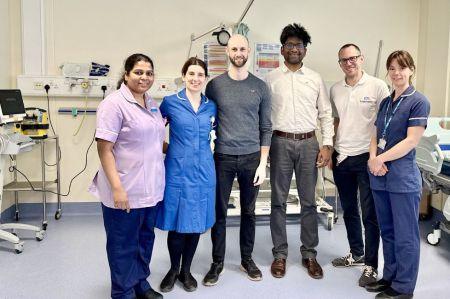
A 24-year-old woman from York has become one of the first patients in the world to take part in a pioneering research study at Sheffield Teaching Hospitals NHS Foundation Trust that could switch off the progression of a rare, incurable muscle-weakening disorder called facioscapulohumeral muscular dystrophy (FSHD).
FSHD is a devastating muscle-wasting disease caused by the activation of an abnormal gene which increases the toxic build-up of the DUX4 protein in muscle cells, resulting in loss of strength in the face, shoulders, arms, legs and hands. There are currently no approved drug treatments for the condition.
Lauren Clarke, who can no longer stand for prolonged periods of time and struggles with simple daily activities such as washing her hair, is one of only a relatively small number of patients across the world to take part in the trial, known as FORTITUDE.
The landmark first-in-human trial is investigating if a targeted gene modifying therapy can be safely delivered to the muscle and alter the underlying cause of facioscapulohumeral muscular dystrophy (FSHD). Patients either receive the drug or a placebo.
The therapy, developed by Avidity Biosciences Ltd, USA, is the first to target the DUX4 gene which is widely viewed as the gene that triggers muscle weakness and degeneration in patients with FSHD. By silencing the gene, researchers believe that the disease’s progression can be disrupted, improving outcomes for patients.
Sheffield Teaching Hospitals NHS Foundation Trust is one of only two non-American centres in the world and the only UK site in the North of England, to be recruiting eligible patients into the trial.
Preliminary data from the first phase of the study, which commenced last year, showed “unprecedented” and “consistent reduction” of the DUX4 regulated genes in a small number of patients at the four-month timepoint, along with indications of functional improvement.
Lauren, who was diagnosed with the condition at the age of 14, said she hoped the revolutionary trial would lead to an improvement or stability in her condition, which has been progressive.
“Looking back I did have traits when I was younger - not being able to use a straw or whistle, but it was such a gradual change for me, I didn’t really notice.”
Since starting university, however, she has become more aware of her disease and its progression.
“I’m slow to walk now. I struggle to wash my hair and put my hair up. There are things I can still do, but it’s hard to go up stairs and there’s a lot of overcompensation and funkier movements. When I go out to late-night bars people think I’m intoxicated because I walk funny. It’s an invisible illness and I’m at the point where it’s quite ‘bad’.”
FSHD is the third most common inherited muscle disease and is estimated to affect between 2,000-2,500 people in the UK.
For Lauren the trial offers hope for the future:
“I’m trying not to get excited but there’s a possibility this gene therapy could improve my condition. I feel very fortunate to have this chance.”
Dr Channa Hewamadduma, Principal investigator and Lead Neuromuscular Consultant Neurologist at Sheffield Teaching Hospitals NHS Foundation Trust, said: “Our neuromuscular team are delighted to be bringing this hugely exciting research to the UK for the benefit of patients in the North of England and beyond. Clinical trials provide an opportunity for patients with rare genetic neuromuscular disorders to access cutting-edge gene modifying treatments before they reach the NHS, as well as give hope to UK patients and the muscular dystrophy community. We have established vital networks to attract several novel targeted gene modifying therapies for rare neuromuscular diseases which are coming through the drug development pipeline. This is another milestone in our leading role in pioneering the promise of ‘gene silencing’ as a way to treat people living with inherited neuromuscular conditions previously thought to be incurable."
Up to 100 FSHD patients are set to take part in the FORTITUDE study across the world, with patients randomly assigned to receive the drug or the placebo.
In Sheffield the study is being supported by the Sheffield National Institute for Health and Care (NIHR) Clinical Research Facility.